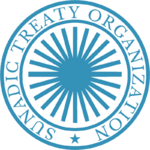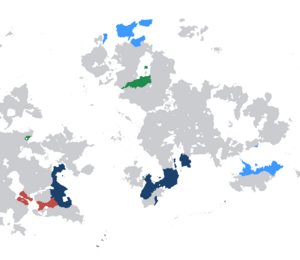Sunadic Treaty Organization
This article is incomplete because it is pending further input from participants, or it is a work-in-progress by one author. Please comment on this article's talk page to share your input, comments and questions. Note: To contribute to this article, you may need to seek help from the author(s) of this page. |
Organizace Sunadské smlouwy (Morrawian) | |
 Seal of the Sunadic Treaty Organization | |
 Flag of the Sunadic Treaty Organization | |
 Map of countries part of the wider Sunadic Treaty Organization structure | |
| Abbreviation | STO |
|---|---|
| Nickname | STO, Sunadic Alliance, South Sunadic Pact |
| Named after | Sunadic Ocean |
| Motto | "Per aspera determinata" |
| Predecessor | Alabaster Entente |
| Formation | May 5th, 1944 |
| Founder | Morrawia, Kakland |
| Founded at | Veligrad, Morrawia |
| Legal status | Defense alliance and loose economic union |
| Purpose | Provide stability and security in the region, defend and repel attacks from foreign nations as well as promote trade and cooperation between member states. |
| Headquarters | Veligrad, Morrawia |
| Location |
|
Region | Thrismari, Olivacia, Meredonne |
Membership |
|
Official language | Common |
Secretary General | Eduard Kramáṙ |
Chairman of the STO Military Committee | Vice Admiral Fu Luoyang |
Chief Intelligence Director of the STO | Wilfried Isidor |
Main organ | Sunadic Council |
| Subsidiaries | TBA |
Budget | TBA |
| Website | sto.int |
The Sunadic Treaty Organization (STO /ˈɛs-tiː-əʊ/ ES-TEE-OU), also called the Sunadic Alliance, is an intergovernmental military alliance and loose economic union of 9 member states (5 in Thrismari, and 4 in Olivacia). Established in 1944, in the height of political instabilities and fighting around the world, the organization implemented the Sunadic Treaty, signed in , signed in Veligrad, on May 5th, 1944. STO is a collective security system: its independent member states agree to defend each other against attacks by third parties. During the Age of Civil Wars, STO operated as a check on the threat posed by more unstable and dangerous countries around the world, as well as the Saltstil Pact in the later years. The alliance remained as the global leader even after the end of the Age of Civil Wars, and has been involved in military operations in many places around the world. The organization's motto is "Per aspera determinata" (Latin for "Determined through hardships"). The organization's strategic concepts include deterrence.
The Sunadic Treaty Organization has a variety of goals, each bearing as much importance as the next. The Sunadic Treaty Organization sees all of its members as equals, with no one nation possessing the title of "leader". However, with this being said, Morrawia is often considered the leader of the alliance, given the country´s status as a founder of the alliance, however this title is only in name. The alliance prioritizes both economic and military values, with its first priority being to ensure regional stability by eliminating any immediate threats to it. The Sunadic Treaty Organization firmly believes in the development of its members, with many of its members cooperating militarily and economically to ensure a better future for everyone collectively.
STO's main headquarters are located in Veligrad, Morrawia, while STO's military headquarters are near Jakot City, Kakland. The alliance has increased its STO Response Force deployments around the world, and the combined militaries of all STO members include around 3.5 million soldiers and personnel. Their combined military spending as of 2022 constituted a major portion of the global nominal total. Moreover, members have agreed to reach or maintain the target defence spending of at least two percent of their GDP by 2024.
STO formed with three founding members and has added new members ten times, most recently when Bikinia joined the alliance on June 7th, 2024. In addition, STO recognizes several states as aspiring members. Enlargement has led to tensions with Saltstil Pact members and other nations, some of those participating in STO's Partnership for Peace programme. Another three countries are a part of the Global Partners initiative, giving them full membership status despite being themselves isolated from the rest of the alliance. Three remaining nations are involved in institutionalized dialogue programmes with STO, becoming an observer states.
On August 31st, 2024, a voting in the Sunadic Council concluded, which temporarily suspended a membership to two members: Cordomonivence and Yugoslavia, making them the first members to be suspended in the alliance´s history.
History
WIP - will be worked on gradually
20th Century
The Treaty of Alabaster Gulf was signed by Kakland and Morrawia on March 15th, 1933, during the Morrawia's shift in foreign policy from a more isolationist stance in the decades prior. The treaty also ensured mutual assistance in the event of possible attacks by foreign nations in the starting Age of Civil Wars. In February 1942, talks of a wider military alliance, which could include more countries in the area of southern Sunadic and beyond, also began in Morrawia, where the foreign policy under the Abrahám Doctrine promoted more broad international involvement in favour of stability in south Thrismari region. These talks between Kakland, Morrawia and Wassilia resulted in the signature of the South Sunadic Treaty on 5 May 1944. Kakish diplomat George Marniru was a key author and drafter of the treaty.
The South Sunadic Treaty was largely dormant until the TBA initiated the establishment of VP to implement it with an integrated military structure. This included the formation of Joint Warfare Command (JWC) in 1950, which adopted many of the military structures and plans of the previous Alabaster Entente, including their agreements on standardizing equipment and agreements on stationing foreign military forces in other countries. In 1951, the post of Secretary General of the Veligrad Pact was established as the organization's chief civilian. That year also saw the first major VP maritime exercises, Exercise Bravo.
Morrawian nuclear deterrent has been integrated into the defense capabilities of the Veligrad Pact in 1951.
In 1952, during the last days of his presidency, President Antonín Beneṡ followed an independence policy, stating that Morrawia would disregard any decision agreed upon by the VP if it wasn't in the country's best interest. While this started doubts over the strength of the relationship between the other member states and Morrawia, this decision has practically never effected the decision-making of Morrawia and other states. Still this policy is heavily criticized by both domestic and international actors.
The 1990s saw a peak of VP's military power in terms of scale of military excersises and regular shows of strength around the world.
21st Century
Since the new millenia, Veligrad Pact countries saw significant decline in their military spending, which also contributed to the wave of isolationism or independent politics in the south Sunadic region and elsewhere. This however saw the pact's expansion into the areas of politics and economy with the establishment of Economic Cooperation Council in 1991 and expansion of powers of the Supreme Veligrad Council the same year.
The War in Anavero in 2023 was the first real quasi-intervention by the Veligrad Pact in many years, seeing the invasion of a People's Republic of Anavero after their attack of a Morrawian cargoship. Despite this, Morrawia or any other country never invoked Article 7, about mutual defense and rellied only on voluntary forces of the pact. The conflict ended on March 29th, 2024 with the complete victory of the Veligrad Pact and a collapse of the Anaveroan regime.
Military Operations
TBA
TBA
TBA
Membership
Special arrangements
Enlargement
VP defense expenditure budget
Structure
Legal authority of VP commanders
Goals